Indonesia
MEET THIERRY ROBINET (who will be leading the "Shamans of the Night" tour from 6 to 22 October 2024)
"THE FLOWER-MEN OF SIBERUT LIVE IN ANOTHER WORLD, BECAUSE THEY ARE IN DIRECT CONTACT WITH THE ANCESTORS!"
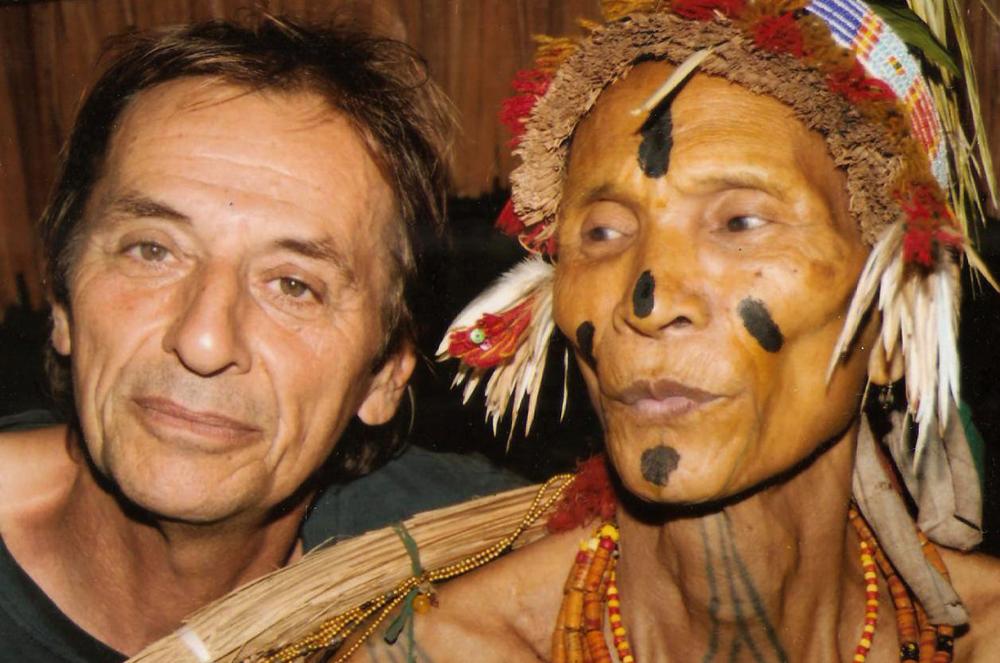
Dominic Clarisse: Hello Thierry, I'm very pleased that you agreed to this meeting, so that the customers of Azimuth Adventure Travel Ltd can get to know you better and therefore better appreciate your work. May I ask you to introduce yourself in a few words?
Thierry Robinet: My name is Thierry Robinet, I was born in Dauphiné-Savoie in France and I've been living in Bali, Indonesia, since 1977. When I was very young, I already had an attraction for nature, spending my life in the trees from the age of 6 onwards, and I also had a great attraction for the globe. That's why I studied maps over the years, learnt the capitals of the world by heart and, at the end of the 60s and the beginning of the 70s, at a time when the great movements were setting off either for America or Asia, I myself took to the road, the one on the other side of my Chartreuse mountains, and set off on the Indian route as far as Kathmandu in Nepal. That was the start of a great journey for me and the start of my life. One thing led to another, and I went to tourism school and became a travel agent, which enabled me to travel by plane and turn my childhood dreams into reality by setting off on the roads of Asia, because for me, Asia has always been my favourite continent.
When I arrived in Indonesia by chance in 1977, I became a correspondent for a French travel agency, notably on the island of Sumatra, to the west of which lies the Mentawai archipelago, where I met some absolutely extraordinary people, perhaps the most extraordinary people I've met in the whole of Asia: the Flower People.
Having become a specialist in Indonesia, I've had the opportunity to explore places where others don't go, in particular the island of the flower people. I also had the opportunity to discover the Indonesian part of Borneo, where I made a west-east crossing of the island that will remain engraved in my mind because I experienced some hellish moments in the jungles. I even went as far as Papua, where you meet people who are as extraordinary as ever, like the stonecutters and the men who live in the trees.
Dominic : I remember that we first met in the early 2000s, when you were working for Ushuaïa. At the time you had done a series of programmes/reports on Indonesia (Kawah Ijen, Irian Jaya, etc.). Can you tell us how you came to work for television, and in particular for Ushuaïa? How have these collaborations influenced your personal and professional life?
Thierry: Television came in when Nicolas Hulot and his Ushuaïa programme came to Terres d'Aventure. They said: "OK, we want to film in Indonesia, and we're looking for someone who knows the country very well". As I was also Terres d'Aventure's correspondent in Indonesia at the time, they got in touch with me and a collaboration of more than 20 years began with Ushuaïa, during which time I was able to take part in numerous reports and documentaries on Indonesia, but also around the world - a lot in South-East Asia, and even in Africa, America, and so on.
I've kept a close friendship with Nicolas Hulot, as he comes to see me regularly in Bali. This collaboration has also enabled me to meet other people, in particular Yann Arthus-Bertrand, with whom I worked on his films 'Earth from Above', 'Home', 'Planet Ocean', 'Woman', 'Human' and so on.
So, for me, television has led to some quite extraordinary encounters with people from all walks of life, particularly on Indonesia. I've worked with Thalassa, Faut pas rêver and so on. I've worked for National Geographic, Animal Planet and many other channels.
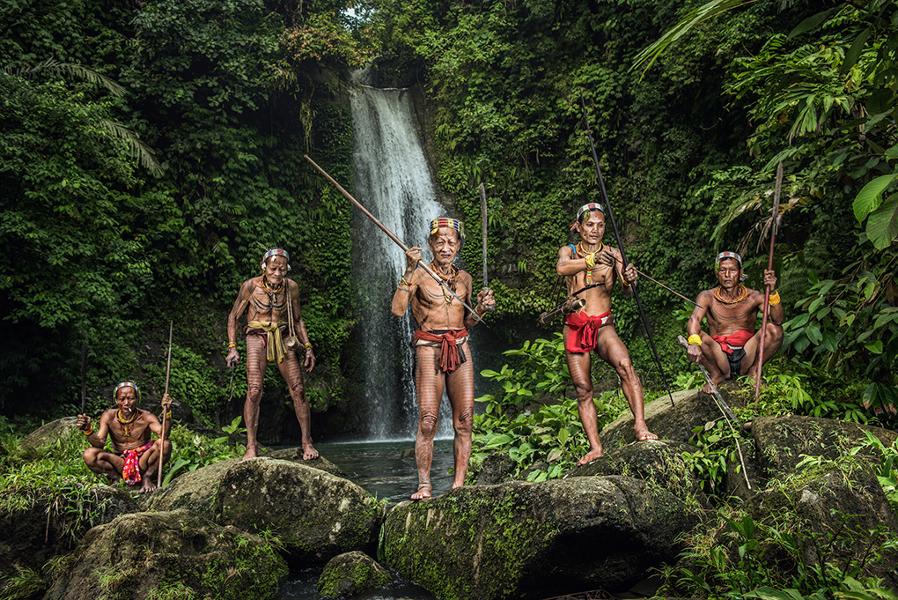
Dominic: You also worked as a stage manager on the set of the film "Toute la beauté du monde". Can you tell us a few anecdotes from the shoot, particularly about your relationship with the director and the actors?
Thierry: Television also gave me the opportunity to make films. They were looking for a specialist on Indonesia, particularly on the island of Bali (as I live in Bali), so I worked on the film 'Toute la beauté du monde' by director Marc Esposito, with Jean-Pierre Daroussin and Marc Lavoine.
I had a very good relationship with them, musically if I may say so, and particularly with Marc Lavoine, who knew Bali well. As we had mutual friends, that brought us closer together and I stayed in regular contact with him, even if, as time went by, all that faded a little. The important thing is that the friendship remains.
What I liked about Marc Lavoine was that everyone involved in the filming was put on the same footing, whether they were French or Indonesian.
I was also very lucky and happy to have met Marc Esposito, who is a well-known director in France. First of all, I met someone who is very attached to the island of Bali, and that allowed us to have a special relationship with him. And as Marc Lavoine was also a regular visitor to the island, it was very interesting to talk to both of them: we had the same ideas.
I was also touched that Marc Esposito chose my wife, Agung, to play a small role in some of the sequences in the film, particularly in Ubud.
That's why I have such fond memories of making this film. Spending 90 days with a film crew is never easy, and I still remember him as a very kind and engaging director. He never raised his voice.
Of course, when you're working on a feature film or a television documentary, things are completely different, because the team surrounding a film crew can number up to 60 people, whereas often, when I was working on Ushuaïa, for example, there were only 10, 15 or even 20 of us at the most.
There were, of course, plenty of anecdotes in a film I shot over 90 days in Bali and Lombok, particularly the evenings I spent with Marc Lavoine playing guitar, because I'm a musician myself, so these are memories that have stayed with me.
I also remember the relationship between Zoé Félix and Marc Lavoine, who are very much in love in the film. Sometimes that led to a few little problems between them, discussions about how they should behave, etc. I have to say that the film was very funny. It has to be said that the film was very special.
I also remember times when the film crew couldn't find certain natural settings, particularly for a scene in the Balinese forest (because, in the film, Marc Lavoine owns a timber concession in Thailand). So I went to see the assistant director and said: "Come with me, we're going into the forest". Marc Esposito followed us and I showed them a fabulous place that I knew from a friend. The assistant said "Bravo" and his team were able to shoot scenes with birds and animals.
I also remember the epic journey to Lombok. There were 90 of us and lots of lorries, which had to be loaded onto the ferry when the sea was rough. And let's not forget the anecdote about the production people who drilled holes in a minibus I'd hired from my pal Gusti. I had to reassure him and the bus was returned to him fully repaired and repainted.
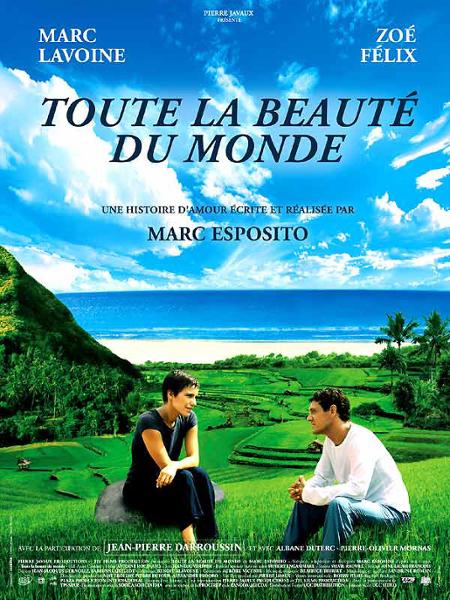
Dominic: You set off on the world's roads at a very early age. Was it a visceral need to escape your daily routine? Why did you finally "land" in Bali and never leave?
Thierry: I think that personally, ever since I was little, I've been a traveller at heart. I've always loved going to see what's going on elsewhere. Even as a child, in my village in the Dauphiné-Savoie region, I had the mountains, all the Chartreuse mountains, the snow in front of me, and behind those mountains was the road to India, the road to Asia, and that, from a very early age, I always wanted to see what was behind them.
So the hippy movement, the movement of backpackers who left for Asia in the mid-60s, generated this way of seeing my future life.
So I hit the road in the early 70s, as soon as I came of age. I left my village in Isère and hitch-hiked all the way to Kathmandu in Nepal. Sometimes it was complicated to hitchhike, but I discovered some extraordinary countries and people, particularly in Afghanistan, a country that has left a lasting impression on me. Nepal is also, in a way, my favourite country, because the Himalayas remain one of the great subjects of the world when it comes to adventure.
Over time, however, after all these personal adventures, I found this opportunity to come to Indonesia, and when I arrived in Indonesia, I felt like I was coming home.
Indonesia is the world's largest archipelago: 17,000 islands stretching 5,000 kilometres from west to east! So it's an extraordinary country, with islands like Sumatra, Sulawesi, Borneo, Papua, Java and so on. And thousands of smaller islands...
There's something happening there, the people are diverse, and the more diverse the people, the more diverse the customs... That's what really interested me.
So I moved to Bali. Why Bali? Because Bali was an island that was different from the others, where life was 'cooler'. Admittedly, life was cooler here, we lived by the sea, so that was something important to me, as were the smiles on the faces of the people and the Hindu festivals that were held regularly, right and left, all over the island. The volcanoes also made me say "I'm going to stay here". What's more, the Balinese are very affable with Europeans, we were always well received, as in the rest of Indonesia, where foreigners are always welcome, and that's something in Asia: there aren't many countries in South-East Asia or even Central Asia that are as warm-hearted as the Indonesians.
Burma is also a country similar to Indonesia, but Burma today has so many problems that it's very complicated.
So I moved to Indonesia, said "I'm going to stay here", and started a family. I met my wife here, and it was precisely because I was in contact with the island that I was able to learn the Indonesian language and certain dialects as well, and then set off to discover some fabulous peoples: the Dayaks of Borneo, for example, or the Una of Papua, who still make stone axes as they did 50,000 years ago. These are things you can't invent.
Indonesia is such a diverse and beautiful country! And then there are the plate tectonics, the earthquakes, the erupting volcanoes... I've always been fascinated by volcanic eruptions. When you see Semeru, Merapi or Krakatoa, which are all mega-volcanoes on the island of Java, it's very impressive.
Dominic: As a tour leader and organiser of television and film shoots, you've had the chance to travel through many countries and, above all, many regions of Indonesia. Which part of the world has impressed you the most and why?
Thierry: I love Indonesia, that much is clear as it's my adopted home. I'm particularly fond of Bali, where I met my wife and became a Hindu myself. I followed my wife and so, in order to become Hindu, I had to carry out ceremonies lasting three days, three months and three years. My wedding was also something extraordinary: I was surrounded by hundreds of people whom, personally, I hardly knew. What's more, I was dressed like a prince, which is a real highlight, because you're not used to living through such a tradition, especially when you're European.
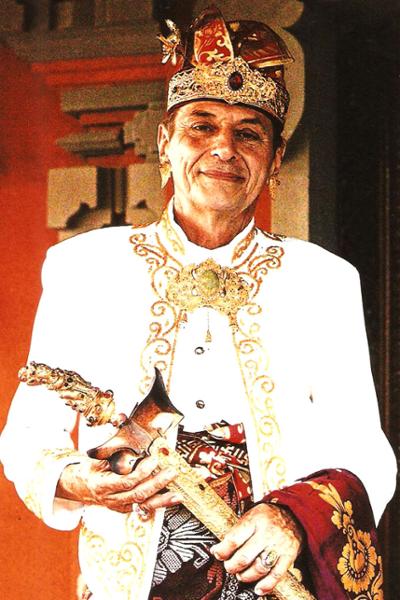
I also underwent the tooth-filing ceremony, as all Balinese must have their canines filed down so as not to look like an ogre, synonymous with bad spirits.
What I love about Bali is that I have many friends everywhere - at Lake Batur, Munduk, Pemuteran, Candi Dasa and Amed, who are extraordinarily kind. And those are things you can't take away. When you love people and people love you, they also show you that they love you very much. That creates strong relationships, and they are strong to the end. In the rest of Indonesia, it's the same!
Dominic: After all these years of travelling the world and the Indonesian archipelago, you still don't seem to be satisfied. What motivates you to keep on 'running'?
Thierry: I'm 71 years old and I still have the same desire to discover the world as I did when I was 15. So it's innate, there's no explaining it, it's just the way it is, I must have fallen into it when I was very young.
What does staying young mean? First of all, it means being physically fit, which means doing sport.
I spent 40 years of my adventure travels walking. I've always put walking first, whether it's difficult or not, and I think that in the end it's always been the key to being in shape on a regular basis, and to not having any particular problems. Everything else is in your head.
When you know how to stay young in your head, there's no problem. When you want to go out and meet other people, appreciate them and know how to look at things through your own eyes, I think you can live - not forever, of course, but you can live to be 80 without any problems and carry on.
Great explorers such as Cousteau, Paul-Émile Victor or Mallory (who recently passed away) all lived their passion into their 80s, and that's perhaps a little of what's in store for me.
Going to the flower men of Siberut or finding myself, perhaps soon, at the Everest base camp in the Himalayas or elsewhere, that's my motivation, that's my driving force.
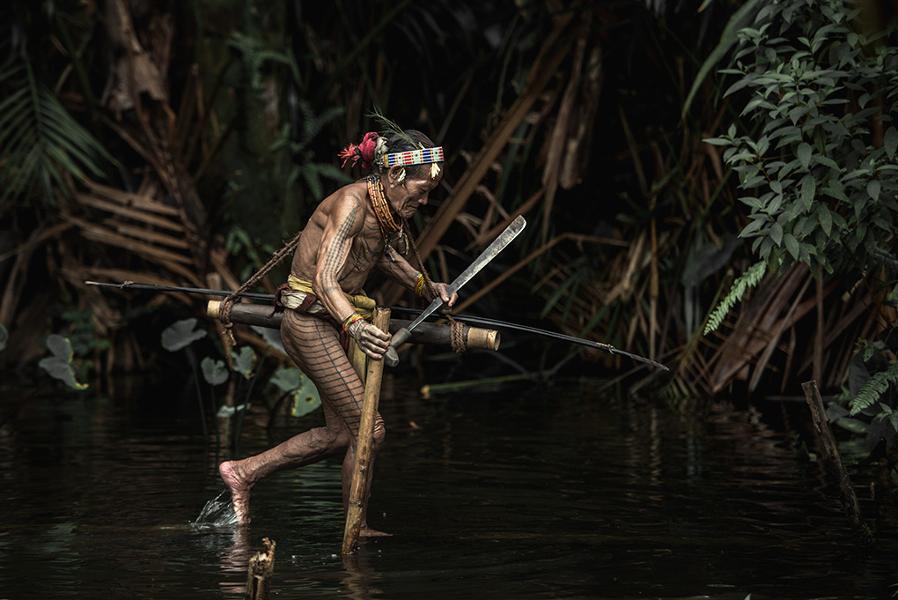
So knowing how to stay young also means knowing how to open your eyes and keep smiling. I may be a man of the past, but when it comes to adventure travel, I'm not a man of the past. I'm a man of the present and I like to go out and meet other people, I like to go out and meet people who naturally have something to show me.
So I like to go where others don't go. I've had a passion for travelling ever since I was a little boy.
Dominic: Finally, can you tell us more about the "Shamans of the Night" tour, which you'll be leading from 6 to 22 October? Is it a way for you to make the hidden treasures of Sumatra better known to the general public? Is it also a way of promoting tourism that's a bit more 'intellectual' (compared, for example, to so-called 'Instagram' tourism)?
Thierry: For me, the Mentawai archipelago is one of the most extraordinary places in Indonesia. In fact, I'm lucky enough to be one of the first people to have discovered this archipelago, which I was able to reach in 1978, hidden away in a boat.
I remember very well the year after I arrived in Indonesia, because that's when I met a priest from Vietnam. He had been fired by the Vietcong and had left Saigon, otherwise he would have been killed on the spot.
He explained that he had a friend who was a priest living in the north of Siberut, so he showed me some photos. At the sight of these, I said to myself "I've got to go there" and so I went there by boat, hidden under tarpaulins, because at the time the destination was forbidden to foreigners. As soon as I disembarked, the first person I met was a policeman, a government official. He asked me what I was doing there, and I told him I was there as a tourist to discover the island. He told me that Siberut was forbidden to foreigners, so I gave him a banknote to let me in...
After several trips, I managed to penetrate to the interior of the island, and I met some absolutely fabulous people there. In particular, I met the great shaman, who became a great friend, with whom I traveled through forests and rivers and with whom I talked so much. He explained to me the role of the forest, that it was the theater of the ancestors. He taught me how to collect eggs from trees, how to eat ferns, how to hunt, etc. And I experienced some fabulous moments in his “long house”, in his lamina.
In particular, I witnessed meetings between shamans coming from all corners of the forest, in order to enter into discussions, in cooperation with the ancestors. I think these are the strongest shamanic dances or rituals I have ever seen.
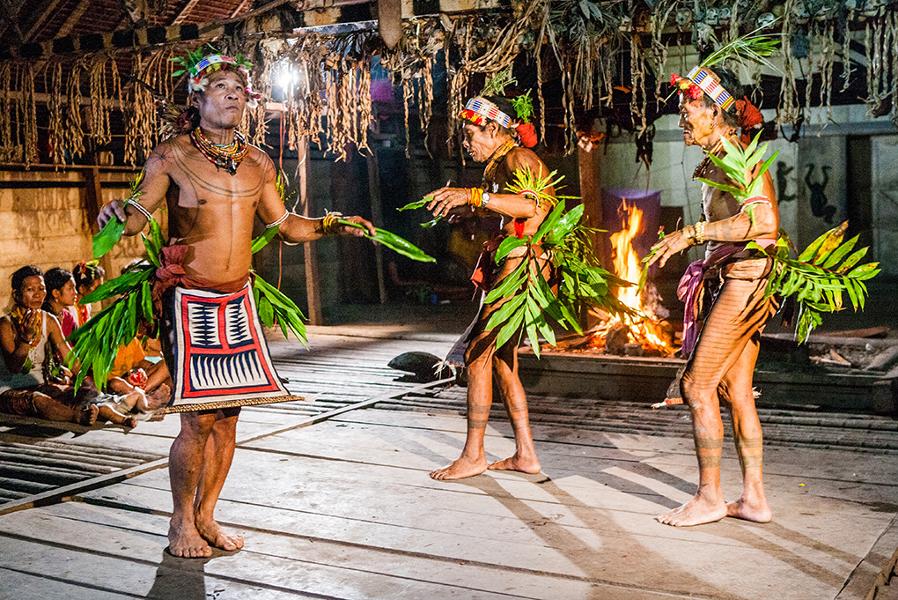
Perhaps even stronger than in Borneo, stronger than in parts of eastern India, and stronger than in Nepal.
The flower men of Siberut are people who live in another world. They come from another world and they live in another world.
Every time I go to Siberut, there are always fabulous encounters that await me. These are moments of sharing with these people who have nothing other than what the forest provides them. These are moments of sharing this existence that we no longer find elsewhere.
So, for me, it's fabulous and that's the reason why I'm going to supervise this trip to the "Shamans of the night" on behalf of Azimuth Aventure Travel Ltd, because I want to share my knowledge with some clients . I want them to meet shamans, men who are other than normal characters, who are very kind people, to have them share moments of life with them, in their house: living with women, going fishing, chatting. , sit and watch, listen to the sounds of the forest. I think that going with the Shamans to look for plants to heal patients is a journey that leaves its mark, and I will ensure that everyone leaves the island of Siberut with strong emotions, especially as the tour ends on dream beaches, we will go fishing, we will eat succulent fish…
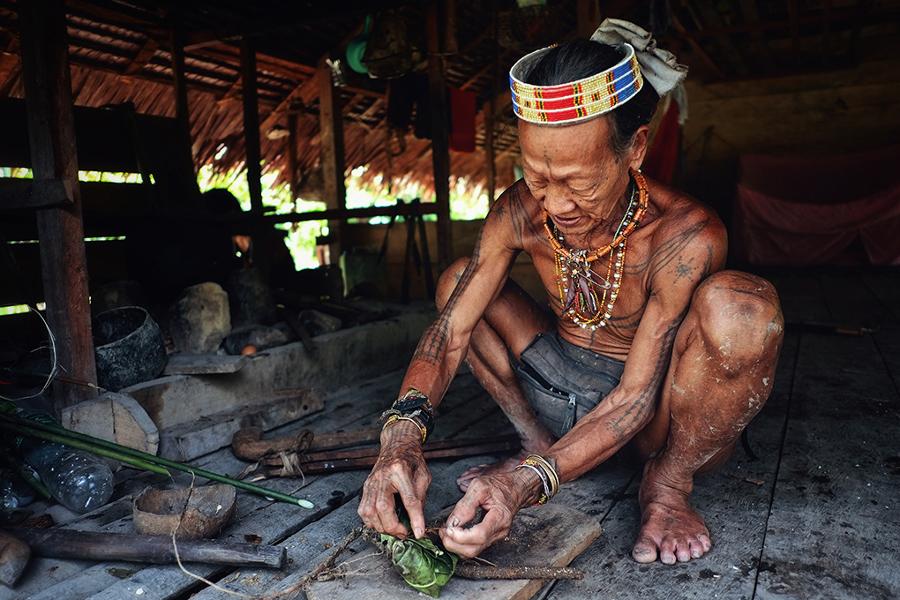
Trips to the flower men are, in my opinion, one of the most exceptional trips in Southeast Asia.
The flower men of Siberut are, as I said, an extraordinary people. These are people who live in another world, who live in another galaxy, because they are in direct contact with the ancestors. For them, nature is everything and they talk to the trees. When we want to cut down a tree to build, for example, a house or a canoe, we will talk to the tree, we will perform ceremonies for it, we will say to it “excuse me little tree, I am going to cut you down because I need you ". But if the flower men don't need it, they will never cut down a tree, or even one of its branches.
These are people who live in another galaxy. And that's what I want to introduce to travelers who are going to join this tour: I want to show them what real life is. Because, now, it's true that tourism, with Facebook, Instagram, we can communicate in two minutes, in ten seconds, we can communicate something. You have an idea and, bang, you pass it on to your boyfriend or friend. But that's for the real adventure.
I live in Bali, I see what Bali is. Bali is an amazing island too, but people are still doing the same things, while there are still lots of amazing things yet to discover.
In Siberut, tourism hardly exists, practically none, so that's where you have to come. You have to come with me and, with experienced Shamans, we will go into the forest to discover what nature is. The Shamans will make us listen to the sound of birds, the sound of trees, the sound of water, they will explain to us what the relationship is between humans and the cosmos, their own cosmos, where the ancestors are called, during the great shamanic festivals, to return home.
And these are things that travelers will see with me, that they will keep forever, because it will be difficult for them to witness them on other trips: nowhere else will they see this particular relationship between man and spirit!
Dominic: Thank you, Thierry, for taking some of your precious time to tell us about your passion for travel and Indonesia.
REGISTER NOW FOR THE “SIBERUT: SHAMANS OF THE NIGHT” TOUR FROM OCTOBER 6 TO 22, 2024!

